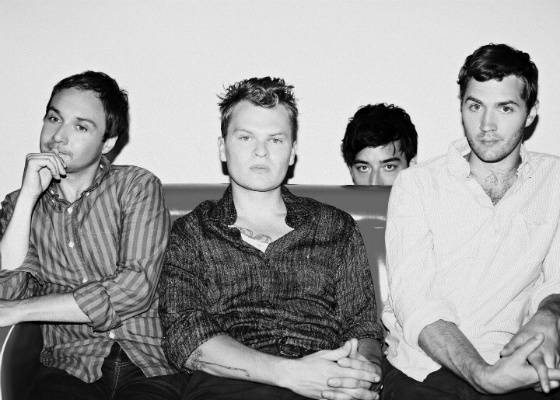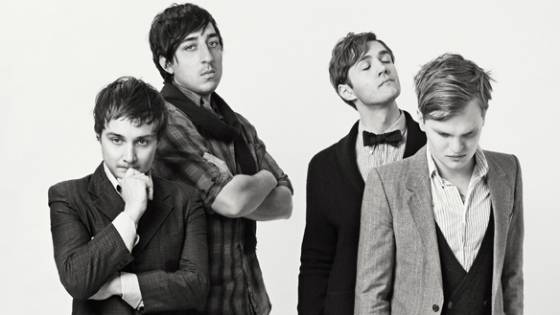
On Wednesday, as isaac arms rightfully professed his admiration for Dylan Baldi and the delightfully raw force of Cloud Nothings, he posed a question about whether or not we (as Americans? as music lovers? just lovers? I’m not sure.) have moved past the point of needing rock stars. He asks, “What have [rock stars] done for us lately?” I think this is a fair and interesting question. It’s, at the very least, a worthy recognition to be sure.
Have we really detached ourselves from the need to couch our musical fervor within the gravity of a compelling rock personality? Has it become too difficult to be unique in the modern world of music? Are labels, the masses, the fading influence of modern radio all too engaged in “accessibility” to allow for another David Byrne to come along, surprise us, and tantalize us with his idiosyncrasies?
Perhaps this has more to do with the ever-changing indie/mainstream division that seems to define our iTunes playlists these days. There sure as hell are plenty of “rock stars,” or at least big personalities, in the mainstream. Heck, don’t we the people elect a new one every few months on the X-factor or whatever show Fox is vomiting onto our television screens this fall? Perhaps the question isaac poses really splits this dichotomy right down the middle. Maybe popular culture in America has gravitated towards the mainstream (read: accessible) personalities, and we allow those individuals to captivate us as long as their music is engaging enough or their “rock star” persona is fascinating enough.
Meanwhile, indie critics often use “popularity” as an attack on the artistic integrity of musicians. Perhaps to be indie is to forego the captivating person behind the music and let the music do the talking for itself. The music is, after all, what we really trust at the end of the day. And while the popularity of “indie” music sure as hell is not removed from the evolution of subcultures and the influence of genres, I feel like we have come to trust art that is detached from the antics of “rock star” personalities. If it’s not about you, it’s about the music … man.
So what do we do, then, with bands like Grizzly Bear, headlining Pygmalion 2012 after releasing their latest album Shields two weeks ago? What do we say about “indie” bands like Bon Iver and Arcade Fire, whose inability to remain unpopular, or just popular enough, has left them both wide open to new listeners and subjected to critique from the same crowd that made them famous? I read a review of Shields this week in Slate magazine that asked why Grizzly Bear just couldn’t be more punk rock. The author wished he didn’t have to work so hard to relate to their music. He wished they would wear their message, along with their melodies, on their sleeves. They just weren’t accessible. To me, that’s some bullshit. That’s lazy. That’s unaware.
Grizzly Bear is a band that, like isaac pointed out, has garnered success without having a rock star mentality and the extracurriculars that come with one. Their step from indie darling to national spotlight has been respectable, in my eyes, because of the fact that they seemed to maintain integrity in the limelight. Grizzly Bear is an example of one of the few anomalies in the music industry who are able to capture success without letting it take over why people talk about them in the first place. They exist in this grey area of stardom without a star, popularity without being pop.

I’m not sure how long this “artistic integrity” will last, look at Justin Vernon for example, but for the time being, this grey area has been good to Grizzly Bear. And the music has flourished as well. Shields is, perhaps, as inaccessible as a popular album can be. The miraculous and meticulous compositions they put forward in songs like “Sleeping Ute” and “Yet Again” are far from pop. They are textured and awe-inspiring, but they can easily be dismissed as noise if you aren’t willing to meet them half way and invest your attention. There are no takeaway pop hooks or catchy melodies you will be singing throughout your day. Not here, not Grizzly Bear.
The thing that amazes me about Grizzly Bear is that a vastly poppier album was what we all expected after the huge success of Veckatimest in 2009. Fame leads to more fans, which leads to a greater need to shift your art to accommodate. At least that’s the typical story. Grizzly Bear’s story is different.
The band began in 2002 as a solo project of Ed Droste, now the main songwriter and vocalist. He released an experimental psych-folk record full ambience and wide-open spaces called Horn of Plenty in 2004 with the help of drummer Chris Bear. It wasn’t until after the album’s release that they joined forces with bassist Chris Taylor and multi-instrumentalist Daniel Rossen. And it was, and continues to be to this day, the collaborative element that defines Grizzly Bear’s work. All despite the fact that this was Droste’s project to begin with.
It was the addition of Rossen that really seemed to set Grizzly Bear onto the path they still find themselves traveling along today. It was Rossen who brought a jazzy and dreamier aesthetic to the experimental folk stylings of Droste’s work. Part of what made Yellow House so captivating was the blending of genre and style into a unique finished product. Very rarely can two unique and talented songwriters co-exist and push the abilities of one another without the rock star ego of one snapping under the pressures to impress the masses (see: Dinosaur Jr).
Grizzly Bear is a band where collaboration reigns. And it isn’t like the members aren’t capable of imagining beautiful music on their own. Rossen in particular has taken the time in between Grizzly Bear albums to pursue solo endeavors that highlight the kind of things he doesn’t get to do in a collaborative space. Department of Eagles is a great example of this. Following the slow moving success of Yellow House, Rossen rekindled a project with a college buddy and spent a majority of the time before Veckatimest was released by Grizzly Bear in 2009 to support that widely successful venture. Chris Taylor similarly set down his bass to promote his solo project CANT before Shields was released.
Grizzly Bear’s latest album Shields, is not the poppy post-success album that many expected. It doesn’t play up the four part harmonies that drove “Two Weeks” to be the stand-out track on the extremely popular Veckatimest in 2009. Instead, the members took their time, stayed out of the spotlight, and crafted an album that represents growth without forcefulness. Shields is by no means raw. It is richly textured, well planned (perhaps to a fault), and beautifully composed. It won’t grab you right away unless you are open to it. This is not punk. It is bold without being transparent. But there is huge growth in this album, and this is especially apparent to those familiar with Grizzly Bear’s whole corpus of work.

Rossen’s songs continue to shine like they have since Yellow House. Droste has become a much better lyricist. He is still reserved, but we get hints of story amongst the mood set by the melody. Chris Bear’s drumming has really expanded since Veckatimest as well. After ten years of sparse drumming around the wide-open spaces of Droste, he has finally figured out how to craft emotion in dynamics as well as anyone. He has set himself in a lineage of great emergent drummers the same way that Nick Mason and, more recently, Phil Selway have.
So, as much as I want to tell you to go listen to Grizzly Bear and experience their collaborative genius on stage, the music really does need to speak for itself. There will be no rock stars during Saturday’s closing act at Pygmalion, but very rarely do we ever get to see a group of artists who have put their music before their fame, even after they have achieved that fame. This truly should be one of the more fascinating and captivating shows that Pygmalion has ever had the honor of hosting.








